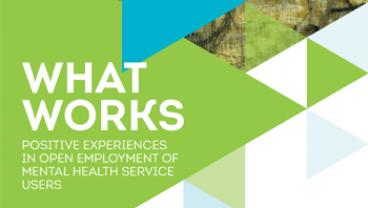Mental illness disclosure can help employees and employers
Discrimination against people who experience mental illness happens in all walks of life and, as research suggests, it prevents or delays recovery.
The Like Minds, Like Mine Step Forward campaign highlighted the incidence and effects of mental illness discrimination in New Zealand and aims to eliminate its occurrence in our workplaces and communities.
The 2010 survey 'Discrimination reported by users of mental health services', commissioned by the Ministry of Health, found 33 per cent of those surveyed did not apply for jobs because of anticipated discrimination. It also highlighted 'finding a job' was ranked as the biggest single area of discrimination by people with experience of mental illness.
According to Taimi Allan from consumer mental health service provider Mind and Body, deciding to disclose experience of mental illness to an employer or potential employer is challenging because of the fear of discrimination.
"Many people I have worked with have been discriminated against in the past and expect it to happen again, or they anticipate it will occur.
"The conditions need to be right for someone to feel comfortable and confident making this decision. That relies on employers stepping forward and being open and non-discriminatory in their practices," Allan says.
The best thing employers can do to encourage disclosure, she explains, is to "create a transparent employment environment that values and supports staff with experience of mental illness".
Employing those who have been through significant challenges in life has benefits, Allan says, "it makes a stronger and more resilient workforce because those who've experienced mental illness are not slighted by the small things".
"Everyone suffers from work stress, but those who have suffered greater have the toolbox to deal with everything. They can end up being great role models for other employees."
From a legal standpoint, the Human Rights Act (1993) makes it unlawful for an employer or potential employer to negatively discriminate against an employee or job applicant because of their experience of a mental illness. New Zealand's Employment Relations Act 2000 requires that both employers and employees act "in good faith".
Wellington Community Law's Kate Scarlet says, in an ideal world employers and employees would be able to discuss health concerns such as mental illness, because it's important for ensuring everyone's needs are meet.
"Employers can't ask, 'Do you have a mental illness?' in a job interview," Scarlet says. "But they can ask you, 'Do you have any condition that could affect your ability to do this specific job?'"
Those who feel they have been discriminated against – either during recruitment or after employment commences – are able to reach out to community law offices via drop-in sessions to seek a remedy.
"We can talk with people about a particular case and whether it meets the legal definition of discrimination," Scarlet says, a community lawyer herself.
"If it does, we can talk to the employer directly, help you call the employer or write a letter, or if necessary, go straight to the Human Rights Commission."
If you want to help end mental illness discrimination in New Zealand, make a pledge and add your name in support.
Article prepared by Fairfax as part of a sponsored media partnership for the Like Minds, Like Mine Step Forward campaign.
Good reads

Making changes in workplaces
No more worries for DHL Christchurch
No Worries is a programme that helps workplaces to better understand, and... Read more

Research
The benefits of positive employment
A recent Like Minds, Like Mine research project has been exploring the... Read more

Editorial
Why talk about mental health at work?
Mental health problems can affect anyone at any time, so it’s critical... Read more

Increasing social inclusion
New wins for No Worries with Mars Petcare
No Worries, a programme managed by Peerzone, is getting down to business... Read more

Workplace wellbeing
Building socially-inclusive workplaces
Ben Bayly is one of New Zealand’s top chefs. Read more

Research
What Works
Workplaces that include and support people with experience of mental illness have... Read more

